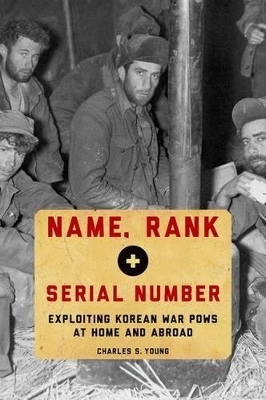
Name, Rank, and Serial Number
Oxford University Press Inc (Verlag)
978-0-19-518348-1 (ISBN)
Vietnam POWs came home heroes, but twenty years earlier their predecessors returned from Korea to shame and suspicion. In the Korean War (1950-1953) American prisoners were used in propaganda twice, first during the conflict, then at home. While in Chinese custody in North Korea, they were pressured to praise their treatment and criticize the war. When they came back, the Department of the Army and cooperative pundits said too many were weaklings who did not resist communist indoctrination or "brainwashing." Ex-prisoners were featured in a publicity campaign scolding the nation to raise tougher sons for the Cold War. This propaganda was based on feverish exaggerations that ignored the convoluted circumstances POWs were put in, which decisions in Washington helped create.
POWs became pivotal to the Korean War after peace talks began in summer 1951. Since fighting had stalemated, both sides raced to win propaganda victories. The Chinese publicized American airmen who confessed to alleged germ warfare atrocities. American commanders worked to discredit communism by encouraging thousands of North Korean and Chinese prisoners to defect. Clandestine agents and a fraternity of anticommunist prisoners launched a violent campaign to inflate the number of POWs refusing repatriation after the war. Armistice negotiations floundered while China and North Korea demanded their soldiers back. United States delegates held out for what they called "voluntary repatriation," but in reality, thousands of prisoners were terrorized into renouncing their right of return. American POWs remained captive for eighteen more months of fighting over the terms of a compromised prisoner exchange. In the United States, details of the voluntary repatriation policy were suppressed. Name, Rank, and Serial Number explains how this provides new insight into why Korea became "the forgotten war."
Charles S. Young is Associate Professor of HIstory, Southern Arkansas University
Acknowledgments ; Introduction ; Part I: Over There ; 1. Limited War Sets the Stage for the POW Odyssey ; 2. The Middle Passage: Life-Changing Horrors in the First Year of Captivity ; 3. Andersonville East: Communist Prisoners are Pressured to Defect ; 4. Welcome, Fellow Peasant: The Chinese Seek Converts ; 5. POWL: Prisoners of Limited War Languish as Propaganda Becomes a Substitute for Victory ; 6. The Failure of Chinese Indoctrination ; 7. The United Nations Command Withholds POWs ; Part II: Over Here ; 8. Home to Cheers and Jeers ; 9. The Brainwashing Dilemma: Atrocity Reports Undermine Punishment ; 10. Prosecutions Rile the Nation ; 11. Target Mom: Disciplining "Misplaced Sympathy" ; 12. Missing Action: Hollywood Films Try and Fail to Fix Captivity ; 13. The Hidden Reason for Forgetting Korea ; Conclusion: Two Wars, the Visible and the Cloaked ; Notes ; Bibliography ; Index
| Erscheint lt. Verlag | 5.6.2014 |
|---|---|
| Zusatzinfo | 13 illus. |
| Verlagsort | New York |
| Sprache | englisch |
| Maße | 163 x 236 mm |
| Gewicht | 510 g |
| Themenwelt | Geschichte ► Allgemeine Geschichte ► Zeitgeschichte |
| Geisteswissenschaften ► Geschichte ► Regional- / Ländergeschichte | |
| Sozialwissenschaften ► Politik / Verwaltung | |
| ISBN-10 | 0-19-518348-7 / 0195183487 |
| ISBN-13 | 978-0-19-518348-1 / 9780195183481 |
| Zustand | Neuware |
| Haben Sie eine Frage zum Produkt? |
aus dem Bereich


